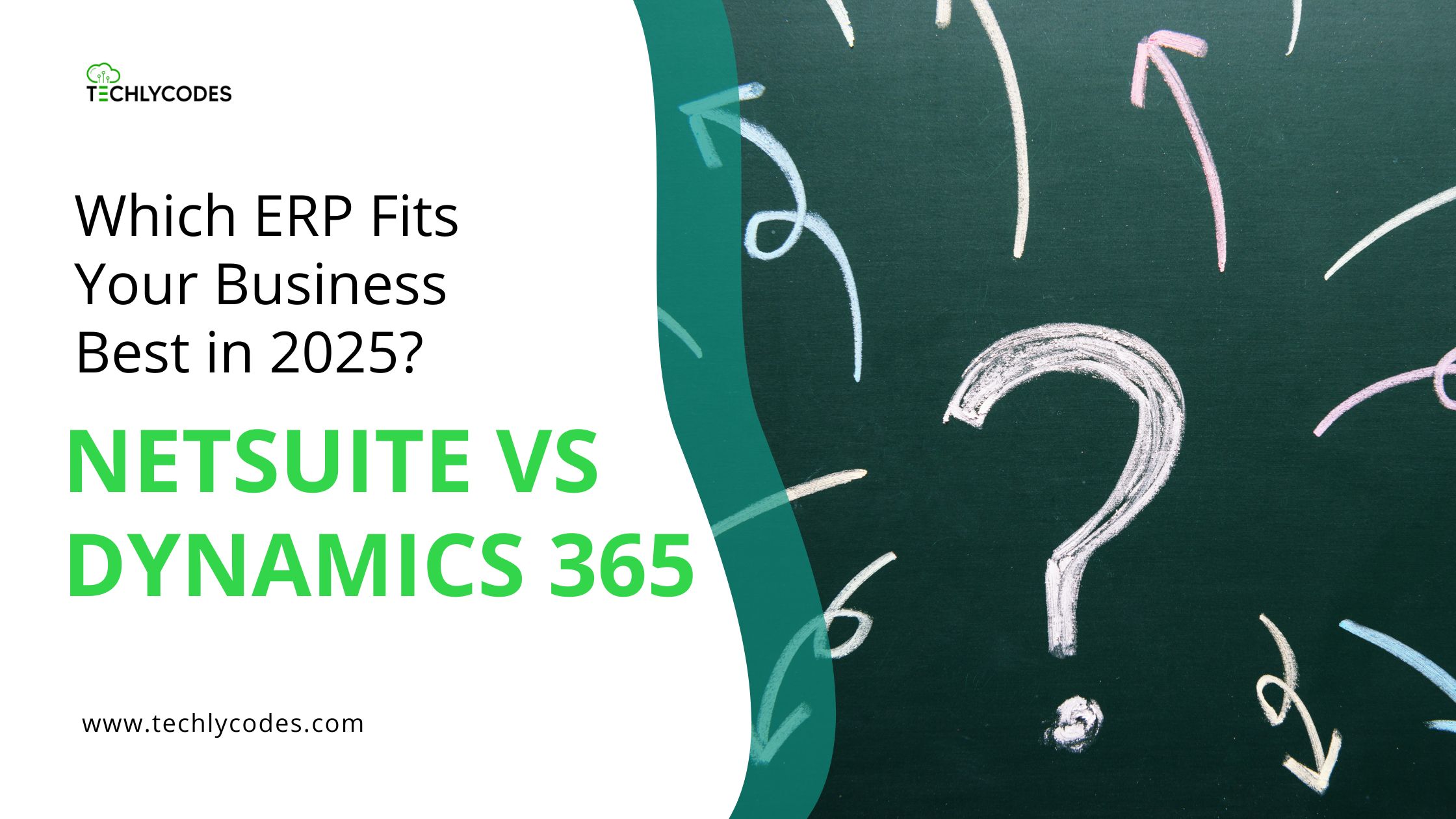In case you are analyzing your options on the subject of ERP solutions, chances are that you have ended up being torn between NetSuite and Dynamics 365. There is nothing surprising about it both of them are giants in the field of cloud ERP, both supported by the giant companies (Oracle with NetSuite, Microsoft with Dynamics 365), both developing quickly to address the needs of modern business.
however: in 2025, selecting the right ERP will not be entirely as simple as comparing the features side by side. It has to do with the knowledge of how every system fits to the size of your business, the industry and future growth of your business without incurring an expensive mismatch.
We are going to dissect the differences between NetSuite and Dynamics 365 in this guide and answer the questions that real buyers are asking.
NetSuite vs Dynamics 365 at a Glance (2025 Snapshot)
| Feature/Factor | NetSuite | Dynamics 365 |
| Vendor | Oracle | Microsoft |
| Core Focus | All-in-one ERP for finance, inventory, CRM, and commerce | Modular ERP & CRM applications |
| Best For | Mid-sized to large companies, global operations, fast-growth startups | Microsoft ecosystem users, enterprises, manufacturing-heavy |
| Deployment | Cloud-only | Cloud or hybrid |
| AI Capabilities | SuiteAnalytics AI, predictive inventory, automated financial insights | Microsoft Copilot AI, Power BI integration, predictive maintenance |
| Industry Fit | Strong in wholesale, manufacturing, large scale, eCommerce, services, non-profits | Strong in manufacturing, government, large-scale retail |
| Integration Strength | Open APIs, SuiteCloud platform | Deep integration with Microsoft 365, Teams, Power Platform |
Who These Systems Really Work Best For
So, I am going to cut the marketing nonsense to discuss real life fit.
NetSuite is the clear winner when you’re:
- An intermediate firm with an ambitious expansion strategy (particularly global)
- Controlling various subsidiaries or legal entities
- Operating multi-location multi-complex inventory operations
- Bored of trying to find an actual one system fits all mentality that is viable?
- Frustrated with having to maintain separate systems in finance, CRM and inventory systems
- Want demonstrated scaleability not integration nightmares
Dynamics 365 makes sense when you:
- Breathe and live Microsoft products (as long as your team cannot be without excel, this counts)
- Have heavy manufacturing needs or operation in the field
- Would like to begin small (1 module) and grow slowly
- Need AI and collaboration tools in your everyday workflow
- Require hybrid cloud alternatives to comply or data storage reasons
The 2025 Feature Landscape: What Actually Matters
Both platforms have been making huge investments in AI and automation but they are doing so in different ways that may have a big influence on what you choose.
NetSuite’s AI Focus: Behind-the-Scenes Intelligence
NetSuite is pumping resources into artificial intelligence and its artificial intelligence work centers around SuiteAnalytics AI and to be honest, it is pretty cool stuff as far as back office goes. The system can now forecast inventory requirements as per seasonal patterns, has ability to automatically flag any suspicious financial transaction, and gives cash flow forecasting which really helps in actual business decision making.
What I adore in the NetSuite strategy is that the AI does not feel like something attached later but is a part and parcel of the system. There are also some cool features that put the system ahead when you look at your inventory dashboard, the system will populate with reorder points based on refined machine learning algorithm (using historical data, supplier lead times, season selling trends, and market influences). It is as good as having a data scientist as part of your ERP solution.
The actual benefit? The AI in NetSuite uses clean and unified data as soon as it is implemented, so it makes more accurate predictions and insights than systems that attempt to analyze disparate data sourced in many places.
Dynamics 365’s AI Strategy: Microsoft Copilot Everywhere
Microsoft has doubled down on their Copilot AI assistant and it is truly transforming how teams engage with their ERP information. Instead of specifying every filer and clicking through each individual value, you can approach your ERP in English and ask it to tell you, in plain words, what you want to see. Say, “All customers who have not placed an order in the past three months however they had high value purchases last year,” and you will get a valuable answer at once.
The Power BI integration means your sales team can dig into data visualization without becoming Excel wizards, and the natural language querying is reducing the learning curve for non-technical users significantly.
Integration: The Make-or-Break Factor
Here; the NetSuite vs Dynamics 365 choice usually comes in terms of what your current technology ecosystem is.
Dynamics 365 integration is magical when your organization operates on the Microsoft 365, Teams and Power Platform. Your CRM data gets automatically imported into Excel analysis, Teams keeps everyone informed about what matters in business processes and Power BI dashboards enable you to get real-time information and view it in the dashboards shown in Power BI.
However, what Microsoft will not paint much is that you need to use their tools to support critical functions (such as Salesforce to paramount sales and marketing tasks, or specialized software within industry), any such integration work could thus involve additional effort and work with no end in sight.
NetSuite is more platform agnostic. Their SuiteCloud platform and powerful APIs mean it is fairly easy to integrate with whatever tools your business relies on. I have been able to connect NetSuite to as well as Shopify and Magento to specific manufacturing execution systems.
User Experience: The Daily Reality
So, I would like to discuss what your team will really feel all the time and this will define whether your ERP implementation will be a success or the origin of endless complaints.
This NetSuite interface has been continuously updating and yet it has a feeling of being an all in one business environment. It has a learning curve, particularly with customers who do not find it easy to use an ERP software. Nonetheless, having your team get used to it the unified aspect implies that they would be able to run complex business tasks without switching in an out of various applications.
The consumer product experience of Microsoft is boundless in the success of Dynamics 365. Dynamics 365 will feel like home right away in case your team works in Outlook, Word and Excel on a daily basis. When operating among the various modules, it becomes the challenge, one gets the feeling that one is operating multiple products and not a unified system.
Making the Right Choice for Your Business
Having assisted tens of companies in making this choice, here is my simple formula of which tool to choose between NetSuite vs Dynamics 365:
Choose NetSuite if:
- You need global ERP capabilities from day one (multiple currencies, tax compliance, subsidiary management)
- You have critical areas that involve management of finances, inventory tracking or multi-location sites
- You desire having a single system that does it all instead of having integrated applications to deal with.
- A full system can be invested in through your team being properly trained
Choose Dynamics 365 if:
- Your company is deep into using Microsoft products and processes
- You must have either sophisticated manufacturing, field service or project management capabilities
- You would want to begin with particular modules and grow slowly
- Your team appreciates the compatibility of interfaces and collaboration
Decision Framework That Works for NetSuite vs Dynamics 365
To avoid agonizing over the features of an appliance, simply ask yourself the following questions:
- Where are your biggest operational pain points right now? Both systems can solve most problems, but their strengths align differently.
- What does your technology ecosystem look like? Deep Microsoft integration versus platform flexibility can be a deciding factor.
- How does your team prefer to work? Some organizations thrive with comprehensive, unified systems; others prefer modular, familiar interfaces.
- What are your growth plans for the next 3-5 years? International expansion, new product lines, acquisitions – these all impact which platform will serve you better.
The Pricing Reality Check Nobody Talks About
This makes it interesting and where NetSuite can prove to have a higher value in the long run than it appears when the prices are compared.
The pricing model of NetSuite is unambiguous and forecastable. You will of course generally be dealing with a more expensive entry-point (watch the ground around minimum annual commitments of around $35,000–$50,000, as the many “mid-sized” implementations go), but in return you are getting a truly end-to-end solution, including finance, CRM, inventory, e-commerce, project management, and ability to work globally on the same system. No undocumented module charges and no surprises when you want extended features.
Although the cost of Dynamics 365 can be considered more flexible at first, this is where most companies are surprised: what can seem to be just 70 dollars per user per month can get very expensive as you get to know that to use the full power ERP at the full potential, you need to license multiple apps. An average user is likely to require Finance & Operations ($210/month), with Sales Professional ($65- 95$ /month) on top, and on top of that are other modules based on requirements of an industry of interest. The additional add-on requirements can cause final Dynamics 365 implementations to end 40-60 percent over initial budget.
The hidden costs that hurt both platforms:
Upgraded plans (trust me you need them)
When it comes to implementation, it will at the very least cost you 1.5-2 times your annual license fee
Establishing proper training of your team (invest in this-for real)
Migration of your current systems advance information Minn Data Inc
Perpetual customizations and integrations
The Bottom Line
The decision between NetSuite vs Dynamics 365 does not rest on deciding which one is better, but rather the most suited to your unique needs, preferences of your workforce and growth strategies.
NetSuite will be superior because it is a single operational, worldwide prepared program that controls multifaceted multi-entity systems with grace. It is especially strong with growing companies that seek all-encompassing ERP capability without having to deal with several integrated systems.
The ability to manage organization specific dynamics has been the major strength of Dynamics 365 in Microsoft-centric organizations where collaboration, well-known interfaces, and modular development take precedence over unified databases.
The firms that succeed on either platform are firms that will carefully evaluate its needs, invest adequately on implementation and training and avoid being too quick to customize.
Don t forget, it is not only the software you are going to use but a whole business solution that your staff will be using on a daily basis over the course of several years. Wait and see not only what each of the systems is capable of, but how it will feel to have to use it in your particular business scenario.


Leave a Reply